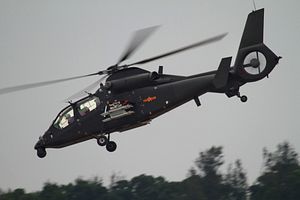The export variant of the Harbin WZ-19 reconnaissance/attack helicopter, designated Z-19E, successfully completed firing tests, state-owned Aviation Industry Corporation of China (AVIC) said in a May 16 statement.
“The Z-19E has shown its maneuverability and operational capability in the just concluded firing flight test phase, which marks a major step for the export model into the market,” AVIC said in the press release. The weapons trials, which began on March 29, lasted for 40 days, according to the company. The helicopter is produced by AVIC subsidiary Harbin Aircraft Industry Group.
The Z-19E is a narrow-body, twin-seat tandem helicopter based on the Harbin WZ-9 medium multipurpose utility helicopter, which in turn is a licensed variant of the French Eurocopter AS265 Dauphin. The helicopter took to the sky for the first time last May.
The recently concluded weapons trials involved the live-firing of air-to-air missiles, air-to-ground missiles, unguided and guided rockets, as well as of the helicopter’s gun systems. However, it is unclear what specific weapons were fired during the trials. As I reported last year:
[T]he helicopter can be armed with up to eight HJ-8s, an anti-tank guided missile (ATGM), or the HJ-10, an anti-tank missile purportedly the Chinese equivalent to the U.S.-made AGM-114 Hellfire air-to-surface missile. The helicopter is also equipped with a 23-millimeter cannon.
The helicopter is primarily designed for anti-tank warfare, but can also strike hardened stationary targets. It can be deployed for various close-air-support missions, and can also engage aerial targets:
Against aerial targets, the Z-19E can also be fitted with up to eight TY-90 air-to-air missiles. The helicopter is also capable of carrying a number of Chinese-made anti-ship missiles, although there is no indication that the domestic version of the aircraft has been inducted by the People’s Liberation Army Navy so far.
China hopes to sell the Z-19E to international customers. A number of countries have already expressed interest in procuring the helicopter gunship, as I noted last year:
The first international customer of the Z-19E could be Pakistan, which has been evaluating the WZ-19, along with the Chengdu Aircraft Industry Group’s Z-10 helicopter gunship, since 2015. A number of Z-10 attack helicopters are purportedly already serving with the 35th “Mustangs” Squadron of the Pakistan Army Aviation Corps.
Overall, Pakistan has been satisfied with the Z-10 except for the underperformance of the two underpowered WZ-9 turboshaft engines, which allegedly have prevented the Z-10 from carrying its maximum weapons payload, including up to 16 HJ-10 anti-tank missiles. China, in corporation with a European partner, has been working on a more powerful engine, the WZ-16. The engine, however, has not entered serial production yet.
Around 80 WZ-19 reconnaissance/attack helicopters are currently in service with the People’s Liberation Army and PLA Air Force.
































